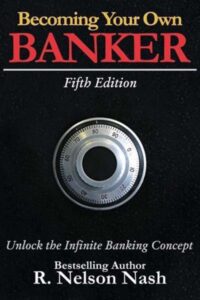If you think the only way to grow your wealth is by investing and saving, then you’re missing out. Here to introduce the banking equation to building your wealth is Vance Lowe. Vance is a Certified IBC Practitioner and the CEO of Private Banking Strategies. With 40 years in the financial industry, Vance has accumulated extensive knowledge in the financial arena, which he now shares with as many people as possible. He joins Matt Fore to educate and enlighten us on the power of becoming your own bank and leveraging insurance policies to maximize long-term earnings and returns. The insight Vance shares in this episode could change everything you thought you knew about money. Tune in for golden nuggets that could hold the key to your financial freedom.
Guest Links:
LinkedIn: https://www.linkedin.com/in/vancedlowe-rfc-chfc-351479100/
Website: https://privatebankingstrategies.com/
Podcast: https://privatebankingstrategies.blubrry.net/
—
Watch the episode here
Listen to the podcast here
The Banking Equation That Will Build Your Wealth Exponentially With Vance Lowe
Vance, welcome to the show.
Thank you very much for having me. I’m excited to be here.
We like to start with the difficult questions here. What’s your favorite ice cream?
It’s very hard to find for me. I like chocolate almond fudge.
That’s a new one. I like it.
It’s hard to find, but I love it.
You’re in Texas. Are you a Blue Bell guy, then?
I am.
I lived in Austin, Texas, back in 2014, 2015, and 2016 timeframe. Do you remember when they had the Blue Bell shortage crisis because something got contaminated, and you couldn’t get it anywhere?
That was devastating for everybody. Some places still don’t carry it because of that.
That’s a shame because Blue Bell is one of the best ice cream brands out there. What’s the scoop? What do you do?
I help people put back the banking equation in people’s lives. What that means is we work hard for our money. Look what’s happening out in the world. The government is going crazy on us. The spending is out of hand. Inflation is now spiraling. I don’t think they’re telling us the truth very much on anything. When we make money, we have to make an account.
Money is filtering through our hands. We earn it. We have to pay tax on it. We have to earn a lot more than we net. That’s a sad thing. We only get to spend it once. You can spend it more than once because you can get it back like the banks. Everybody will agree. The banks always get the money back. All we have to do is understand and learn a strategy. We can do the same thing.
My mentor years ago, R. Nelson Nash, told me, “It’s not so much what you don’t know about money that hurts you. It’s all about what you think you know about money that’s incorrect.” We’ve got the herd mentality. Everybody thinks they’re doing it right because they’re all doing the same thing. You’re here to tell them, “It’s not only wrong, but it will be 180 degrees opposite of what you think.”
It’s not so much what you don’t know about money that hurts you. It’s what you think you know about money that’s incorrect.CLICK TO TWEET
This is so fun. I was getting ready to retire years ago. I told my partner when I brought him in that he was going to make me rich someday. We enjoyed a money management firm for seventeen years running and never had any losses. In 2008, it dipped down. We weren’t able to get the earnings we needed, but at the end of 2008, a client walked into my office, gave me a book, and royally screwed up my life. Have you ever had a whole paradigm shift? The whole shift has to change. He gave me R. Nelson Nash’s book, Becoming Your Own Banker.
As a money manager and a strategist to help fluent clients retire financially independent, we were very successful doing that, but we had to spend a lot of time. The unknown factor was the market because that means the money goes away from us. We have to depend on other people. You don’t even have to do that anymore. You can make twice or three times the amount of return tax-advantaged and never take any risk except for that guy or that gal looking back at you in the mirror. If they’re shady characters, then we’ve all got problems. That’s what I do. I love doing it.
I want to talk about the idea of infinite banking. Our readers out there know I’m a fan of this. I have several policies. I leverage it to do my investing and build my investment portfolio. Take us back to reading the book for the first time. For our readers out there, can you explain Becoming Your Own Banker? Tell us a little bit about the book and what it states there, and we will go from there.
In Nelson Nash’s book, he covers five issues we have to defeat almost every day. One is called Parkinson’s Law. He goes through that law. It’s about living a luxury once experience becomes a necessity. We over-live and overindulge ourselves in many things in life and are not able to set aside the money we need for retirement. We have to defeat that. We have to live on less than we bring home.
The next one is the golden rule. If you’re a religious person, everybody has the definition of the golden rule, but it’s not true in the banking world. He who has the gold makes the rules. There’s a great story in there. He goes on to talk about, “Use it or lose it.” We’re going to learn something brand new about money. If you don’t put it to work and replace the way you used to think, then you fall prey to your old habits. You’re going to repeat the same things.

Infinite Banking: We’re gonna learn something brand new about money and if you don’t put it to work and replace the way you used to think, then you fall prey to your old habits and you’re gonna repeat the same things.
Here’s the best way to check. We all do it. Over the last few years, are you where you want to be? If that answer is no, something has to change. You can’t keep repeating the same thing over again and get different results. You have to change something and replace it. It’s the same thing with a bad habit. You have to replace it with a good habit.
We’ve got the Willie Sutton Law. Willie Sutton was a famous bank robber. The reason that’s in there is that as soon as you start making money, somebody is going to try to take it away from you, the IRS. We’ve got to have some type of tax strategy. It’s critical that we defeat those rules and those laws. If you can defeat them, you’re going to win by default because no one else can.
There’s the grocery store story. The reason that’s in there is that we cannot steal from ourselves. If we create our bank, we have to do the same things that clients do in our bank. If we borrow money from our bank, we don’t get a better rate. We should charge ourselves more because we will earn more money. Two more things he points out in the book are critical. It’s called imagination.
Think of a little child as they’re growing up. When they get excited, they explode, don’t they? It’s unchecked. When a clap of thunder hits and they don’t understand, the vision of terror in their minds cripples them. They fall to the ground because their imagination is unchecked. Over the years, we have learned how to tame that, haven’t we? That’s to our dismay, our demise, or however you want to put that. Imagination is critical. It’s all about how we think. There’s a different way to think about everything.
That pretty much encompasses the book. There are charts, illustrations, and all kinds of things. I use that book with my clients. I tell them, “That book is your resource book. As you learn the concepts, you will find it in the book and swear it’s not there.” That’s the book. We use that a lot. We usually introduce our little book because our little book is online. It’s a download. People are free to look at it. It tells our story and then leads straight into Nelson Nash’s book.
I remember the first time I read the book. I honestly didn’t understand it. It took me 2 or 3 times to sit down, read it word for word, and try to think, to your point about imagination, of ways I could apply the concept in terms of my investment portfolio. It started to click. The reason why it didn’t make sense to me is that it’s against the money principles that were taught, which is to give your money to someone else, let them grow it, and don’t touch it for 40 years, and then when you want it in 40 years, there will be more there.
It talks about ways you can efficiently use taxes and control your money more than anything. I want to tap into the story of the grocery store because that’s one of the best examples of how he uses to explain the concept. The lesson he teaches in the grocery store is that if you’re going to be your bank, you have to be an honest banker. Can you tell us a little bit about the grocery store example and what the lesson is there?
It goes back to an outside idea. We finance every single thing we purchase. Most people don’t believe that. Most people have been taught, including me, by my parents and mentors that the best way to get through life is to pay cash for everything. It’s not only wrong. It’s 180 degrees wrong. A lot of people will disagree with that because they don’t have to pay outside interest, but they forget about the inside interest they would lose because they disobey a principle.
Most people have been taught that the best way to get through life is to pay cash for everything. That’s not only wrong, it’s 180 degrees wrong.CLICK TO TWEET
There are three principles we have to obey. One is called the 10% rule. There are two parts to this. Part A, never spend the principal. Part B, don’t ever contemplate breaking rule number one and then working off a well-designed financial plan. People choose not to obey these three and wonder why they can’t make it. The grocery store story is about putting your principal to work and getting it back. It’s all about what the value is. He talks about what happens if one can of peas gets stolen. How many cans of peas does that take to replace? It was 26 or 27 cans of peas to break even.
If our spouses go in, shop, and go out the backdoor instead of going through the check stand, that’s a loss to the store. It’s almost impossible for the store to make it up, but other people will watch that person go through the backdoor, and the employees will feel like, “I’m entitled.” That store will never reach its potential. Branch it out. You have a metal shop, a woodworking shop, or any other type of business. If you think you can get that product wholesale or for free, your business will never get there. That’s why that story’s in there. You can’t steal from yourself.
It talks about leakage in your personal economy. This idea of you financing everything you buy comes down in my view of when I buy a car for $25,000 and then lose the ability for that $25,000 to be invested in a real estate portfolio and in a certain stock market or whatever it is, I lose the ability for that investment to grow. I do have lost opportunity cost. When I read that story about the peas, we buy these peas for $0.30 and sell them for $0.33. If one of them goes missing, I have to sell ten cans of peas to break even on the one that went missing. It’s this idea of an uninterrupted compound and how you can put your money to work uninterrupted for the longest amount of time.
Why don’t we share with the audience exponential compounding? This is where the bank’s mentality is. This is not the average thinking out there, but I can make this crystal clear and give everyone an experience of why banks lend money. It isn’t about interest rates. I found out that you still have a car payment. The outstanding balance on your car payment to pay it off was $10,000. Let’s say, for some crazy reason, the interest rate is 10%. Your monthly payment is $500. Vance Lowe Lending Institution would buy that debt in a heartbeat. Why would we buy that? What do you think the audience is going to say?
It’s a consistent income stream.
“I’m going to make 10%.” Let me change that number from 10% down to 1%. It doesn’t change my enthusiasm for buying that debt. It’s not about the interest rate. There are only two numbers left, my $10,000 to buy the debt and the monthly payment. Let’s walk through this and do the math. There’s no growth factor or anything else here. Five hundred times 12 is $6,000 per year. If I take my $10,000 and put it to work buying your debt, I’m going to receive $500 per month or $6,000 per year. If I divide my volume of return or the $6,000 by my money at work, that’s a 60% volume rate of return. Is that high enough?
Yes.
What if it’s tax-free? Do you want your earnings on that high or low? You want it as high as you possibly can. You could charge yourself 25% and still keep the payment at $500 because you don’t care how long it pays off. What you care about is how long you want that to last. It’s not about getting the $10,000 back. It’s about getting all the money back on the cars you spend. You can either say, “I’m kissing it off. It’s worthless to me,” or, “I was kidding. I want all that money back.” This is the motivation. This is how we do it. It’s about the volume of return.
When somebody refinances a mortgage for a quarter of a point thinking, “Look how much better off I’m going to do,” they hose themselves so badly. It’s irrecoverable. You shouldn’t refinance. If you’re at 15%, you can’t unless you’re going to live in the home and die in the home. It’s because you’re always going to return to payment number one. If you’re at a 3% loan, it’s going to cost you 96% interest, “Wait a minute. I’ve got a 3% loan.” You have a 96% loan. Have you calculated when they’re going to get to 3%? It’s the very last payment. It’s only the last payment in year 26. There’s still over 26% interest that they’re paying.

Infinite Banking: It’s about the volume of return.
That changed my mind on thinking about debt in general and refinancing. It’s the fact that the first 7 years of a 30-year mortgage is when the bank makes all their money because in your payment of $500 in this situation, $490 of it is going to the interest, and $10 is going to the principal. Around seven years, it’s $250 and $250. They’re like, “Let’s refinance you. You can get a lower rate. Your payment will go lower,” but all of a sudden, you reset the clock of how much money you’re giving away.
We have taught the public why interest rates fluctuate because they turn on the average every 5 to 7 years. They have to either move, get a new home, sell, or refinance. Mortgages have to go up and down. What’s happening in government has screwed things up, but that has hurt the economy. It hasn’t helped it at all.
Let’s use this car example. When I buy a $10,000 car and give it in cash or take a bank loan against that car to pay that debt down, that money is going to someone else. If I borrow it against my infinite banking policy or my bank, then all of a sudden, there’s going to be a cost of capital there. You’re going to pay more than $10,000 because there is an interest rate, but that money is going directly back into your bank for you to access again. If you spend it with a bank loan with Bank of America or pay cash for it, that money is gone. All you get is that car.
You can easily make the same profits that the bank makes. We should make sure if you haven’t done this already. I believe the banks are and have been completely unethical for a long time. I believe the United States fought a war in 1900, and we lost. The Federal Reserve was born and has taken over our country and run it from the shadows ever since. That’s in the book The Creature from Jekyll Island. Everybody should read that so they understand what we’re under and the effect of it now. Our only hope is to get back the information they don’t want us to have. They cannot control this. There are no taxable events inside your personal economy.
There are no taxable events inside your personal economy.CLICK TO TWEET
Let’s try to level-set in case we have lost some readers out there. What are we talking about when we’re talking about being your bank? What kind of policies?
There’s a special contract that existed when the pilgrims came over. Insurance companies were created because of the banking need. It was life insurance, but it was still because of different needs. It was participating in mutual whole life insurance companies that were created and born and were owned by the policyholder. What’s critical is that you get ownership. A lot of things have evolved. You look at Nelson’s numbers in his book. They don’t quite correlate, but the theory is still there. It doesn’t matter whether it could be higher or a little lower. He’s teaching correct principles, which is what I love.
Years ago, we were on a campaign of going to all the mutual companies and seeing if they wouldn’t bring back what created them. If they had stock divisions, it was no good. Great contracts like New York Life, Northwestern Mutual, Metropolitan, and all of these have great contracts, but they hate IBC. You will get investigated for money laundering because it’s the same scenario. You want to move money out and move money back because it’s the perfect money warehouse. You can store money there and get above-market returns even though they have lowered the guarantees. On top of that, you make profits. It’s the safest place on the planet to store your money. That’s what we use.
There are a couple of different factors here to make sure we’re level-setting with everyone. 1.) It’s a whole-life policy. It is not a term policy. 2.) It is a mass mutual company, not the company MassMutual. It’s a mutually owned company, which means that if it’s on New York Stock Exchange, we’re not talking about that. 3.) It has to be properly structured. There are a lot of different debates out there talking about term versus whole life and why term makes more sense than whole life.
For 70% to 80% of the time, I agree with that argument. The term makes more sense than whole life if you are trying to rent life insurance. If you’re trying to implement an IBC policy, then it has to be properly structured, which means that we are going to reduce the death benefit as much as possible and try to stuff as much cash into the vehicle as possible. Did I miss anything there to make sure we’re talking about the same thing?
I am so grateful that you said that. People, listen to what he said. I call it the pornography of IBC. There are groups out there that pedal policies. They will give you all different combinations and splits. Beware of those who push indexed universal. Any indexed or universal life is a hybrid term contract with increasing rates. It has no guarantees. They will argue with that saying, “There’s a guaranteed rate.” There are no guarantees that the prices aren’t going up. There will be no money there at death. The early ones and all of them I know of have blown up. I don’t know of many people unless they died young.

Infinite Banking: Beware of those who push for indexed universal life insurance policies. Any index or universal life insurance policy is a hybrid term contract with increasing rates. It has no guarantees.
It’s funny you say that because I was listening to this conversation that was talking about how universal and indexed universal are so new to the market that now that we’re starting to see that back-half of those policies, they’re starting to fail out. I want to give an example for our readers to conceptualize this. When I talk about properly structured, we want to shoot for 80% to 90% cash value accessible within the first year with a breakeven term of around seven years.
This is where people get lost in this IBC concept because they say, “I spent $25,000 for this policy. I only showed $24,000 or $23,000 of cash value after year one. I’m losing money on it.” First of all, you’re not because if you died that day in that first year, you’re going to get a $1 million death benefit. You paid $25,000 for it. $1 million back on $25,000 is a pretty darn good investment. We can agree with that.
Two, it’s not meant to be an investment. It is a warehouse vehicle. You and I are so aligned on the fact that I use it for big chunks of capital that flow through my economy as a place to set it, let it grow 4%, and still have access to it but still have some of the benefits like asset protection, no taxes, and then a death benefit at the end.
Let’s have the people look at it one other way. In a startup company, all the statistics come from life insurance and the experience of life insurance. If you and I were going to start a business and you set $25,000, we do all the math, the budget, and everything else. We decide we’re going to have to invest from our capital $25,000 a year to keep the doors open. How long does a new startup company take to make a profit? The average is 3 to 7 years.
In our company, if we could pull out 60% in year one, did we make a profit? Did we have a good startup year? In year two, when we put money in, if we could pull out 75%, are we headed in the right direction? If I could show you a guaranteed investment that in year five, with every $1 you put in, you’re going to make $1.10 to $1.20, or you’re going to be over 100% efficient, how many of those do you want?
As many as I can get.
The breakeven that we do is five years. We care about the people. We don’t care about what other people say about the policies as long as we can start banking immediately. We find that a little bit lower than what you mentioned gives you a much faster breakeven point instead of 7 or 8 years in year five. We draw part of the premium in year five, which is the paid-up additions rider, because we found a laddering effect. There are all kinds of things.
This is where we get creative.
We can get creative. All we want to share with the clients is there’s a better way than the way you’ve been doing it. If you can get the money back, you can use it again. You don’t have to pay tax on it all over again. Every person who spends $1 thinks they have to earn $1 to replace it. That’s not true. They have to earn $2 to $10 if they’re an entrepreneur because they have to pay all that overhead.
I try to equate it to people that flip houses out there. They typically understand this concept a little bit better because they are paying an exorbitantly high cost of their capital. In some of the fix and flip private money that I do, we underwrite for two, meaning if you take a $100,000 loan, you get $2,000 to get access to that money. I’m going to charge you 12% interest of 1% a month until you pay me back that money.
What I try to shape the mind of is if you flip a home and make $100,000 profit, put that in a policy that will grow 4% a year. You have access to $90,000 of it. It’s not the full $100,000, but you at least have access to a majority of it at the cost of capital of 5% versus the 12% you were paying and recycle that money. You’ve taken that $90,000. You’re putting it in a new flip all while the $100,000 is still growing at 4%. Did I miss anything there? Is there anything you want to add there?
It’s not that I’m concerned. It’s still the absolute safest place on the planet. This is the safe haven. This is what we can count on. The banks and the owners have sold all their stock. They put their money in life insurance.
There’s an interesting study out there that talks about Tier 1 capital. In a bank, you have to have liquid access in your “Tier 1 capital” meaning if things go to heck, we’ve got this money sitting right here that we can access. I forgot the study, but isn’t 10% or 20% of a bank’s Tier 1 capital in whole-life policies? It’s a safe place. If you want to be your bank, follow what banks do. The first thing they do is stuff their cash reserves into these types of policies.
It’s not audible. It’s private. They can borrow just like everything else. I did the study with Bank of America in 2017. There’s $9 billion for their executive bonus retirement program in premium annually. They don’t get the policies when they retire. The bank cashes anywhere from $5 to $7 million on the death of their employee.
The fact that you brought up audibles and not showing up on a personal credit report is a big thing for entrepreneurs and, specifically, active real estate investors as well. I’m going through the process of buying a new home. When they pulled my credit report, they were like, “You have all this debt out there. Your DTI ratios are way out of whack, and things like this. Our cost of capital to you to buy a home even though you have a great income, all this rental income, and all this stuff is going to be higher because you have all this debt out there,” whereas, in a policy, it is private between the insurer and me. It’s a private contract. It never shows up on a credit report.
It’s not only that. We have gotten very used to easy capital over the past few years. I can walk into any bank at any time and get a line of credit or money. As liquidity gets sucked out of the system and as we get constrained here, those easy lines of credit are not going to be as easy as they once were. This policy, when written correctly, is a guaranteed line of credit from the insurance company that I can access at any time with no questions asked.
If I text my insurer now, within two days, I’m going to have money in my bank account. That’s an often overlooked aspect of whole life when people say, “There’s a cash drag on it. You only make 4%, while the stock market was making 20% in 2021.” It’s down to 19% in 2022. They’re not looking at all these other factors of it. I’ll stop there before I go on my tangents here. Is there anything you want to add there?
With these contracts, we get preferential treatment because we’re owners. We get to go to the front of the line. They do ask two questions, “How much do you want? Where do you want it sent?” There is no payback. There are no questions about paying the money back if you’re borrowing it. You have access to it. You can borrow and put it back or take some money and not put it back. There are all different ways to do that. This is exciting.
Like you, when you first read the book, I had a little bit different experience. I started reading the book at 9:00 at night. I did not get any sleep that night, and neither did my wife because I kept poking her. The more I read, the angrier I got because I had been looking for this my entire life. Everything was clicking for me, but by morning, I had a feeling of depression I couldn’t overcome, “Where was this years ago? I’ve missed the boat. I’m too old for this.” It spurred me to call Nelson the very next day. He answered the phone. The rest was history. He laughed and said, “I’m not laughing at you, but you have every opportunity a young person has, just not quite as long.”
How many policies do you personally have?
I have fourteen. I’ve been doing this for years. I’m now closing on number fifteen.
That’s one of the things I wanted to highlight. I have a couple of policies. When you find people that are interested in this and they fully understand the concept of how to leverage this to maximize their returns and take control of the banking aspect of their life and their money, you will find that they sometimes have a dozen, if not a couple of dozen policies out there.
The guru Nelson Nash signed me to, which is Ray Poteet, years ago had 153 policies that he owned. He had been practicing for 25 years. He was adding three new policies a year. In banking, if you can’t put the money to work, you expand your bank. Those are the concepts. This is simple. We will probably make it more complicated than it is. It doesn’t take me twenty minutes a month to run this complete concept with all five companies paying the bills and squaring everything. It doesn’t even take twenty minutes.
In banking, if you can’t put the money to work, then you expand your bank.CLICK TO TWEET
This is fantastic. I want to switch this now into our last round. We’re calling this the Five Toppings. Our first one is this. I might know the answer to this. What is your favorite book? What is a book that you’ve read that has given you a paradigm shift?
It’s Nelson Nash’s book Becoming Your Own Banker. I can’t tell you how many times I’ve read it. I memorized it. I was required to because every time I asked a question, I would get slapped figuratively speaking, “What does it say on page 28? Click.” They would hang up on me. I’ll be darned. There’s the answer. Lifelong, I’m a Christian, and everything else. The most meaningful would probably be the Bible because every time I change an aspect of life, I can read the same verse, and it means something different.
That’s another book where all the answers are already in there if you look hard enough. Our second one is this. I believe the person you become ten years from now is directly correlated to the habits that you have and the things you do every single day. What are some of the habits that you have?
I am highly competitive. I’m old now. I get up and work out every day. I do precision competitions. I do long-range shooting and archery. When I started archery, I always thought when I grew up that it was a sport. It is not a sport. It is a discipline. I practice that almost every day. I try to keep my body in shape. I’m very active. I have a ranch. I only work three days a week now. This isn’t work. It’s a passion that I have. I tend my ranch. I’ve got a woodworking business that I love to be in. I do work with my hands. That’s what I do every day.
I’m sure there’s a lot of meditation to that, too, because you have to calm your mind and body and lower your heart rate to be able to precision shoot. Is that true?
Archery is the best discipline. You have to see the arrow hitting the edge before it releases. It has to release on its own. You cannot release the string, or it won’t hit it. It’s your subconscious. You learn all about how powerful that is.
That’s interesting. Our third one is this. What’s the best piece of advice you’ve ever received?
My dad told me that. My dad and I never had a very good relationship all growing up. I went into the service and served a two-year church mission, but when I went to the service, he said, “Son, in life, if you find something you always want to do, you’ll love to do it. You will never have to work a day in your life.” I was a blue-collar all the way through. My dad was a Geneva Steel worker. I pursued money and loved it.
I immediately learned I have got to get everybody else exactly what they need. My needs are taken care of. It has always been that way. I’ve got an absolute passion for this stuff where everybody wins. There are no losers except if you steal from yourself. You can’t blame the market, the government taxes, or anything. The little illustration I showed you compounds your money every two and a half years. How successful is that? Why would you need to do much else? Real estate is critical. I drank that Kool-Aid a long time ago. You have to have those types of hard assets.

Infinite Banking: Everybody wins. There’s no losers except if you steal from yourself.
Our fourth one is this. What is the thing that you’re most proud of in your life?
It’s my family. I have four children. You work where you have to, live where you want, and raise your family. I’ve always been able to focus. I see so many people going after the dollar. Their marriages fail. Maybe I’m lucky or anything else, but I’m more in love with my wife now than I was years ago. I got married when I was 24. Luckily, we’re still together. Everybody has their ups and downs, but we have 4 great children and 10 grandkids. In my family, what I do here is help other people. That’s my best accomplishment. The low line might continue after me.
Our fifth and last one is this. If you could sit down and eat a bowl of ice cream with anyone, dead or alive, who would it be and why?
I’m so enthralled with Nelson Nash. I would pick his brain every chance I got. He downloaded a lot of stuff to me, but it was hardly scratching the surface. You know what an iceberg looks like. I got the tip. Nelson would be good. I would also like to sit down and have more conversations with my father because growing up, we didn’t have a very good relationship. In the end, we had a great relationship, but that’s time under the bridge.
For those of you that don’t know Nelson, go to YouTube for some of his talks because he has the best accent I’ve ever heard in my life. We were joking about it beforehand. That would be a fun conversation.
He is such a pure and honest individual. Do you know what his best job is if you were to ask that same question?
What’s that?
He was a Sunday school teacher. He taught a Sunday school class every Sunday. He loved it.
Vance, this is a fantastic conversation. Our readers know I’m a huge fan of the policy and the work that you’re doing over there. If our readers wanted to reach out to you and learn more about what you have to offer and the eBook that you mentioned earlier on your website, where’s the best place we could point them?
We also have an eight-year analysis. You can take it for a test drive without any type of commitment. You can see your results over an eight-year period, along with not doing the strategy. It’s PrivateBankingStrategies.com. On there, you can download a free eBook and look at all of our podcasts. The best thing to do is to do your reading first. Convince yourself.
The best thing to do is do your own reading first. Convince yourself.CLICK TO TWEET
We do an exploratory call. Most people tell me right up front, “I’m already sold on this. I need to know how it works. Let’s take it for a test drive.” There’s enough information. Don’t get lost in the pornography out there. Go to Nelson Nash’s website or our website. I promise you my whole dedicated life that everything on that website is factual and honest. There are no projections. It’s all math.
Thanks for coming on.
Thank you so much for having me. I appreciate you.
Important Links
- Becoming Your Own Banker
- The Creature from Jekyll Island
- PrivateBankingStrategies.com
- eBook – How to Grow Rich with the Secret that Banks Don’t Want You to Know
- https://InfiniteBanking.org/
- https://www.LinkedIn.com/in/VanceDLowe-rfc-chfc-351479100/
- https://PrivateBankingStrategies.blubrry.net/
About Vance Lowe

Vance Lowe With 40 years in the financial industry, Vance Lowe has extensive knowledge in the financial arena, extending far beyond his numerous accreditations, honors, and accolades. For over two decades, Vance owned and operated a successful money management firm. He now funds millions into private banking entities every year.






